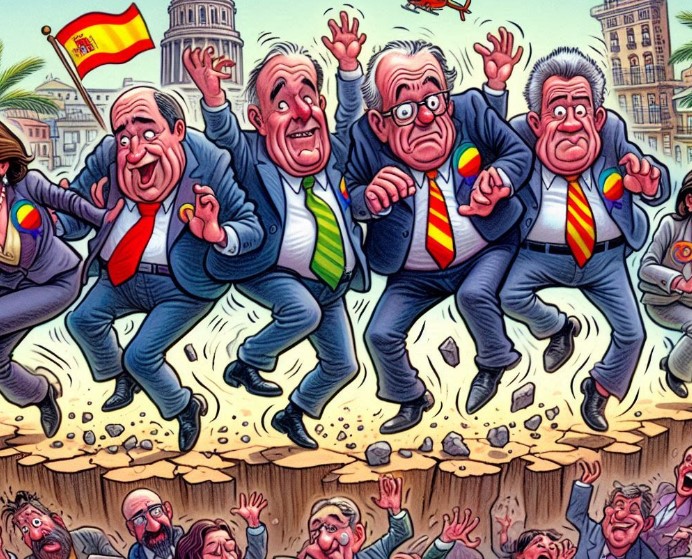A scandal involving opaque audio recordings and alleged political interference is sending shockwaves through Spain, putting the government under immense pressure. At its center is Leire Díez, a hitherto unknown civil servant whose leaked conversations are creating turmoil in the Spanish political landscape. The case has now directly reached the Moncloa Palace, severely escalating tensions between the government and the opposition, while street protests reflect an increasingly restless mood.
Who is Leire Díez and what role does she play?
Before the scandal broke, Leire Díez worked as Director of Institutional Relations and Philately for the state-owned Spanish postal service, Correos. Although a member of the socialist party PSOE, she held no official political post. Her duties were purely administrative, such as presenting special stamps. Her seemingly unpolitical role makes the revealed events all the more explosive.
The Incriminating Audio Recordings: Insights into a Web of Accusations
The Spanish newspaper El Confidencial recently published shocking audio recordings showing Leire Díez in conversation with businessman Alejandro Hamlyn. Hamlyn himself is accused of fraud in the fuel sector. In these recordings, Díez allegedly offered assistance to the public prosecutor’s office. In return, she demanded information about Antonio Balas, a high-ranking officer of the Guardia Civil, the Spanish military police. These conversations raise serious questions about the integrity and independence of state institutions.
Why the Leire Díez Case is Causing Uproar in Spain
The enormous explosiveness of the case lies in the identity of Antonio Balas. He is the head of the Central Operational Unit (UCO) of the Guardia Civil, a special unit specializing in corruption and serious crimes. Balas is currently leading several sensitive investigations concerning the direct environment of Prime Minister Pedro Sánchez:
- Alleged irregularities related to the prime minister’s brother and wife.
- The so-called “Koldo Case,” a far-reaching corruption scandal involving suspicious contracts during the pandemic.
Should it turn out that someone from the ruling party’s inner circle attempted to influence Balas or obtain confidential information, this could be considered a serious political interference in the judiciary. This would severely undermine the principles of the separation of powers and shake public trust in the government.
The Political Reaction: Distrust, Protests, and an Eclat
The conservative opposition, particularly the Partido Popular (PP) under Alberto Núñez Feijóo, has sharply attacked the government. Feijóo went so far as to call the PSOE a “mafia” and Pedro Sánchez a “godfather.” The demands are far-reaching:
- The PP does not rule out a motion of no confidence against the government.
- A large demonstration has been called for June 8 in Madrid to express public discontent with the government.
The government and the PSOE party leadership, however, strongly distance themselves from Leire Díez. They emphasize that Díez held no official function and acted on her own initiative. This demarcation is intended to minimize damage to the party but is met with skepticism.
Escalation in Madrid: A Public Confrontation
The already tense situation reached a new peak this morning in Madrid. Leire Díez made a public appearance to comment on the recordings. She once again stressed that she had acted on her own initiative. However, the appearance dramatically escalated when businessman Víctor de Aldama suddenly entered the room. Aldama, known for his involvement in the “Koldo case,” loudly accused Díez of lying. What followed was a veritable scandal involving loud accusations, insults, and physical jostling. The situation could only be calmed by the intervention of businessman Javier Pérez Dolset, who was also present. The entire, embarrassing scene was broadcast live by several media outlets and highlighted the deep divisions within the Spanish elites.
Legal Action and a Deep Crisis
Following the incident, Leire Díez announced that she would file a complaint against Aldama for harassment, threats, and attempted aggression. Aldama, in turn, also announced legal action against Díez. This incident has not only shocked the public but also triggered a deep crisis within the ruling party. Such a shameful incident had not occurred in Spanish politics for years. Meanwhile, not only the opposition but also members of the government and numerous PSOE voters are demanding early elections.
What Could Happen Now: The Future of the Spanish Government
The Leire Díez case raises important questions about the independence of the judiciary in Spain and potential political influence on ongoing investigations. The ongoing tensions, both in parliament and on the streets, point to an uncertain future for the current governing coalition. Observers abroad see this incident as a clear sign of the deep cracks and fragile stability within the Spanish government. The coming weeks will be crucial to see how this scandal will impact Spain’s political landscape.




